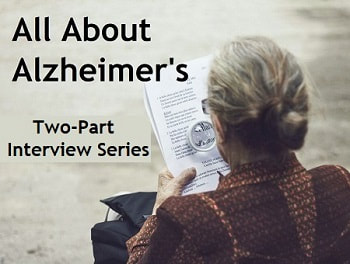Healthy Mind
|
|
Alzheimer's Prevention
January 2022
Staff
According to the World Health Organization, “More than 55 million people live with dementia worldwide. Alzheimer’s Disease is the most common form of dementia and may contribute to 60 to 70% of cases.”
“Experts agree that in the vast majority of cases, Alzheimer's, like other common chronic conditions, probably develops as a result of complex interactions among multiple factors, including age, genetics, environment, lifestyle and coexisting medical conditions. Although some risk factors — such as age or genes — cannot be changed, other risk factors – such as high blood pressure and lack of exercise – usually can be changed to help reduce risk,” the Alzheimer’s Association reports.
Although research is still evolving, evidence is strong that people can reduce their risk by making key lifestyle changes.
In November, Myrna Haskell, executive editor of Sanctuary, spoke with Sherry Kelly, Ph.D., about what’s new in research and recent advances in diagnostics. They also discussed early warning signs in Part I of a two-part conversation titled “All About Alzheimer’s.”
On January 20, Part II of the series focused on prevention: What can we do now to help prevent certain types of dementias or better protect ourselves from cognitive decline as we age? Topics that were discussed included:
According to the World Health Organization, “More than 55 million people live with dementia worldwide. Alzheimer’s Disease is the most common form of dementia and may contribute to 60 to 70% of cases.”
“Experts agree that in the vast majority of cases, Alzheimer's, like other common chronic conditions, probably develops as a result of complex interactions among multiple factors, including age, genetics, environment, lifestyle and coexisting medical conditions. Although some risk factors — such as age or genes — cannot be changed, other risk factors – such as high blood pressure and lack of exercise – usually can be changed to help reduce risk,” the Alzheimer’s Association reports.
Although research is still evolving, evidence is strong that people can reduce their risk by making key lifestyle changes.
In November, Myrna Haskell, executive editor of Sanctuary, spoke with Sherry Kelly, Ph.D., about what’s new in research and recent advances in diagnostics. They also discussed early warning signs in Part I of a two-part conversation titled “All About Alzheimer’s.”
On January 20, Part II of the series focused on prevention: What can we do now to help prevent certain types of dementias or better protect ourselves from cognitive decline as we age? Topics that were discussed included:
- What do we know about early-onset Alzheimer’s?
- Is there a brain-gut connection?
- Is engaging in regular exercise and keeping our lives organized important for brain health?
- What lifestyle changes should we make now to keep ourselves vibrant?
- Is socialization important?
- How can we approach an elderly parent or loved one about her plans for the future?
ADDITIONAL RESOURCES
Readers can also find this excellent article concerning keeping our brains healthy by Dr. Sherry Kelly:
How to Keep your Brain Vibrant
Read more about the brain-gut connection from Science Daily:
Link Between Alzheimer's Disease and Gut Microbiota is Confirmed
Readers can also find this excellent article concerning keeping our brains healthy by Dr. Sherry Kelly:
How to Keep your Brain Vibrant
Read more about the brain-gut connection from Science Daily:
Link Between Alzheimer's Disease and Gut Microbiota is Confirmed
Find Parts I & II below:
|
|
|



